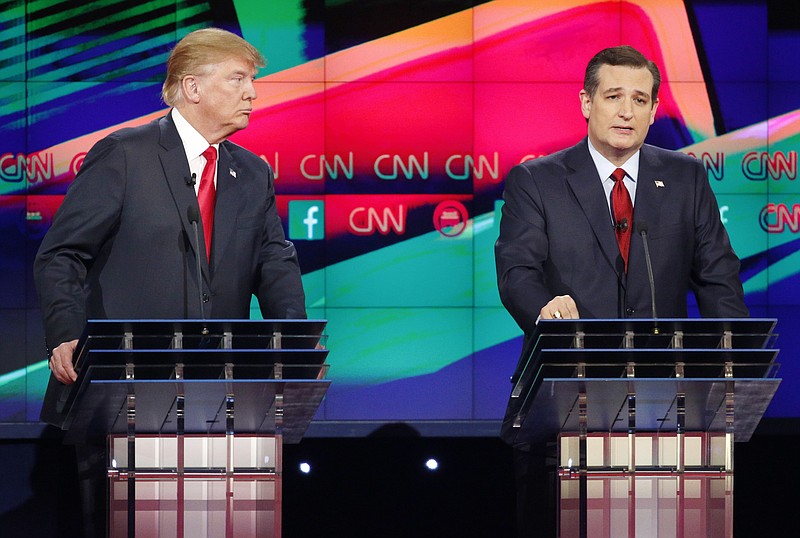Candidates took their last prime-time shots at each other before Christmas in Tuesday's CNN Republican Presidential Debate, but it's unlikely anything said at the Las Vegas forum is going to immediately dislodge front-runner Donald Trump.
What is becoming clear, though, is that the businessman's closest rivals going forward are likely to be freshmen, Cuba-American senators Ted Cruz of Texas and Marco Rubio of Florida. Former pediatric neurosurgeon Ben Carson has been fading, and no other contender appears to be moving.
Still, as several candidates reminded viewers, all nine on stage - and four in the previous undercard debate - exhibited sounder defense plans than Democratic front-runner Hillary Clinton, who has praised President Barack Obama's handling of foreign affairs, and would make infinitely better leaders.
Here is one observation of how the debate left the field:
MOVING FORWARD
' Chris Christie - The New Jersey governor reminded viewers of his former position as a federal prosecutor and his current job as a chief executive (as opposed to the U.S. Senate, where three of his competitors work) and correctly described the nuances of a surveillance spat between Cruz and Rubio as "angels dancing on the head of a pin. Nobody in America cares." He repeatedly returned to the mantra that protecting the security of Americans would be his No. 1 job.
' Ted Cruz - The Texas senator, on the heels of a poll showing him leading in Iowa, apparently felt taking on Rubio was the right strategy for him. Their back-and-forths probably were a draw, but Cruz - in clocking the most speaking time in the debate - made it clear he would defeat "jihadism" and compared himself to Israeli hard-liner Prime Minister Benjamin Netanyahu.
' Marco Rubio - The Florida senator was never ruffled by attacks from Cruz and Sen. Rand Paul, but he had to be on defense rather than on offense, which served him well in previous debates. He made it clear Trump's Muslim ban suggestion was "unconstitutional," that he'd push for more military spending and that he believes in securing the borders long before any thought is given to allowing any semi-permanent status to current illegal immigrants.
STAYING IN PLACE
' Jeb Bush -More forceful than before in attempting to take on Trump (calling him the "chaos candidate" and suggesting his Muslim ban was "not a serious proposal"), the former Florida governor stressed an already formed strategy for the Middle East, a need to rebuild the military, the need to give the FBI the tools it needs and his leadership ability. He also frequently reminded viewers that Clinton's policies would be similar to those of Obama.
' Carly Fiorina - One of the debate series' strongest performers, the former Hewlett-Packard executive was off her game a bit, sounding more whiny, repetitive and not quite as confident as on other nights. But she did skewer Trump on sounding like Obama on one point and talked about the need to call back the country's best military minds that the president put out to pasture when they didn't agree with him.
' Rand Paul - The most dovish candidate on the stage, the Kentucky senator hammered against "arming the allies of [the Islamic State]," against pushing for regime changes in the Middle East, for Arab boots on the ground against the Islamic State and against the collection of data for security purposes. He also earned the evening's "acts-most-like-a-kindergartner award" for attempting to insert into an argument the "Bridgegate" scandal involving Christie.
MOVING BACKWARD
' Ben Carson - Although he appeared to have boned up on foreign policy and even asked for Congress to declare war on the Islamic State, the retired surgeon looked weak at times, once refusing to "get between" Cruz and Rubio and offer his opinion on a question and another time eschewing the ongoing actions of the Islamic State by saying we need to "think about the needs of the American people before we go off and try to solve everybody else's problems."
' John Kasich - In the wake of attacks in Paris and San Bernardino, the Ohio governor seemed to have donned his tough-man shoes, suddenly talking about destroying the Islamic State (and the U.S. leading a coalition to do so), allowing the government to have all the data it needs and getting rid of Syrian President Bashar Assad. He also brought up Vice President Joe Biden's one decade-old, good idea of dividing Iraq into three countries. But it's probably too late for him.
' Donald Trump - Petty and childish at times, the businessman continued to lack depth to back up his statements about the "great wall" he'd build, the parts of the Internet he'd shut down in an effort to combat terrorism, the families of Islamic State members he'd kill and the ban on Muslims he'd put in place. Whether he means it or not, he also reiterated his promise not to run as a third-party candidate should he not get the nomination.
